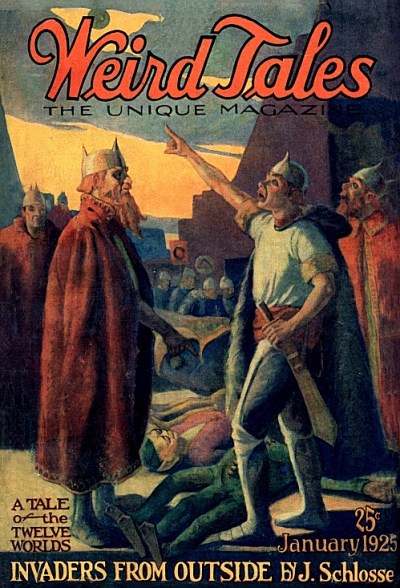INVADERS FROM OUTSIDE (3)
By:
September 22, 2023

J. Schlossel’s first story, “Invaders from Outside,” appeared in the January 1925 issue of Weird Tales. It was one of only six stories that he’d publish. SF historians agree that — with its solar system of inhabited planets, a council of worlds, and a space battle between fleets of ships — the story is an early example of “space opera.” HiLoBooks is pleased to serialize it here for HILOBROW’s readers.
ALL INSTALLMENTS: 1 | 2 | 3 | 4 | 5 | 6 | 7 | 8 | 9.
The inhabitants of the Twelve Confederate Worlds were not individualists. They had advanced beyond that stage on the day when their separate worlds had united, for on that day each race had given up its deep-rooted dream that its own peculiar species had been created supreme above all others. It was the intelligence, not the form or color of their fellow creatures, that they held in high esteem.
Messages in the musical tinkling universal language of the solar system were hourly broadcast from the central broadcasting stations on each planet. The latest news and all the improvements in the field of science throbbed through the ether on equal terms with the commercial matter that was being sent out continually.
It was strange that their instruments should be of such strength that they were able to search out and assign to its proper place the smallest and most minute star, yet not know of the approaching body.
A message came from Mars, the most industrious member of the Confederacy, that its scientists were working on an intricate instrument that would easily separate into its component parts the thousands of star clusters that dotted the region beyond the Milky Way. When this new instrument would be completed, the Martians promised, they would be able to see the surfaces of the dark bodies that attended the bright stars throughout the heavens.
The Confederacy was enjoying its golden era of peace and prosperity. There was no sign of war or strife. The tremendous advancements in every field of activity had long since eliminated the drudgery from existence. Life was very sweet, but not cloying. One question loomed up large: would not this perpetual peace and ease breed a race of cowardly degenerates?
The inhabitants of the twelve worlds had never been called upon to risk their lives against an invading force. They might be soft, as compared to their progenitors of the dark and bygone past, in the matter of muscles and in their ability to resist the naked elements. But what of it? Life was not so hard now. There really was no need of brawn. And besides, their science had made them practically immune to all the disease germs that bred within the solar system. Even though they were soft in the matter of muscle, their span of life was from twenty to fifty times the full life span of their early ancestors. Who could foretell whether they would prove in a pinch to be a race of cowardly degenerates or not?
And then, entirely unexpected (for danger always comes unexpected), from one of the huge observatories on Japetus, the outer moon of Saturn, there came an imperious command that all broadcasting immediately cease. As the broadcasting died down a message was repeatedly flashed through the ether: “A large body of planetary dimensions is hurtling toward the solar system at a terrific velocity.”
The Martians worked night and day to complete their intricate half-finished instrument for long distance observation. It was completed at last and ready to be tested. It lived up to their highest expectations. Without any further delay it was sent to Japetus and there set up for observation.
Nothing further could be learnt with the old instruments. The inhabitants of each world waited for something definite to come from the Martian observatory on Japetus.
Some frightened inhabitants of the Confederacy demanded that governments declare martial law and conscript every individual so that they could commence building and outfitting a fleet of great stellar transports large enough to give every one a chance to flee from the doomed solar system. A few, more learned but equally wild, suggested that the Scientific Society of the Twelve Confederate Worlds concentrate their combined energies toward finding a way to hurl Neptune, the outermost of the solar family, out to meet it. But most of the inhabitants waited quietly, numbed by the terrible threat of doom.
No attention was at first paid to those who let their emotions run away with them, but later, when the hysteria of the few was spreading like wildfire, it was decided to banish all who were inclined to excessive nervousness to some far off spot until the crisis was either past or their fate definitely settled.
RADIUM AGE PROTO-SF: “Radium Age” is Josh Glenn’s name for the nascent sf genre’s c. 1900–1935 era, a period which saw the discovery of radioactivity, i.e., the revelation that matter itself is constantly in movement — a fitting metaphor for the first decades of the 20th century, during which old scientific, religious, political, and social certainties were shattered. More info here.
SERIALIZED BY HILOBOOKS: James Parker’s Cocky the Fox | Annalee Newitz’s “The Great Oxygen Race” | Matthew Battles’s “Imago” | & many more original and reissued novels and stories.
